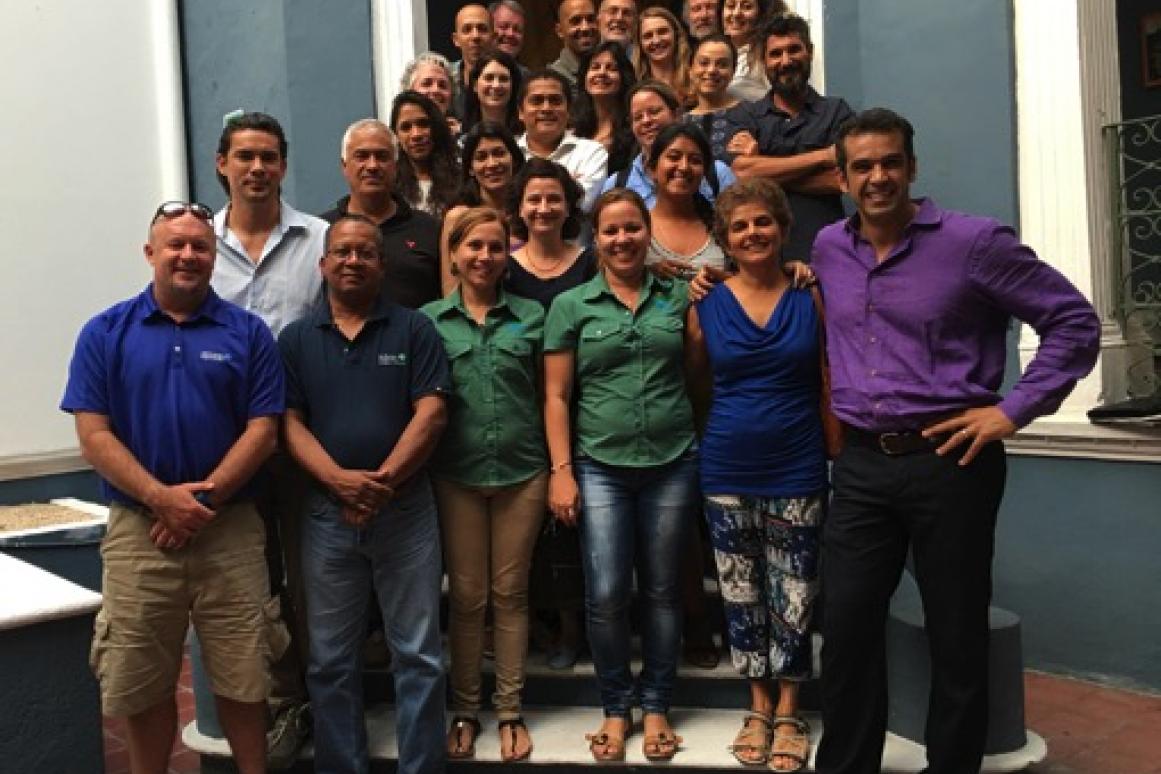HRI Collaborates on International Gulf Coral Reef Workshop

After 55 years of political isolation, change is afoot in relations between the United States and Cuba. After the December 17, 2014 announcement by Presidents Barrack Obama and Raul Castro to normalize relations between the U.S. and Cuba, CubaMar has found itself in a unique position to advance joint marine research between our countries.
Yet even before the 2014 announcement, CubaMar was hard at work building bridges through marine science through the Trinational Initiative (TNI), a collaborative platform founded by CubaMar, Harte Research Institute for Gulf of Mexico Studies (HRI) and the Cuban Ministry of Science, Technology and Environment in 2007. Through this platform, every year, scientists from the three countries that share the Gulf of Mexico (Cuba, Mexico and USA) have met to discuss research plans and chart the course forward for targeted research projects that help solve some of the regional problems facing the Gulf of Mexico and Western Caribbean. The last TNI meeting took place in November 2015 in Havana and had the largest participation since this platform was established in 2007.
The first week of May, CubaMar, in collaboration with our partners at the Universidad Nacional Autónoma de México (UNAM) and HRI, organized a workshop that brought together again members of the Coral Reef Working Group of the Trinational Initiative. Twenty-eight participants from the U.S., México, and Cuba representing 14 different government agencies, NGOs, and academic institutions met to define coral reef research priorities for the Gulf of Mexico and Western Caribbean region. The workshop was hosted by UNAM and funded by HRI and CubaMar.
This was an exciting meeting because it was the first meeting of any of the Trinational Initiative working groups (there are six of them) outside of the larger annual Trinational Initiative workshop. The idea came about during the last TNI meeting in November when members of the Coral Reef Group realized that the interest, the ideas and the projects generated by a much larger group than previous years deserved more time to be discussed. Thus, shortly after returning from Havana, CubaMar and our colleagues at UNAM started planning the Mérida workshop, to focus on developing research topics and specific objectives for coral reef research in the area.
The objectives of the workshop were:
- Identify bi- or tri-national coral reef projects for the region with specific objectives that answered participant’s interests, as well as their institutions and national priorities (e.g., connectivity, coral restoration, spatially explicit biodiversity database, etc.)
- Identify uniform and comparable sampling methodology for coral reef ecological assessments to be used by collaborating institutions across the three countries (e.g. alternatives to AGRRA protocol, resilience assessment protocols, etc.)
- Identify potential funding sources for each project
- Develop a plan to document the actions of the TNI coral reef group in English & Spanish, adapting the Trinational Initiative Plan of Action, and the new research priorities identified at TNI 2015 in Havana
The workshop opened with presentations on an overview of new coral reef research priorities in Cuba; a recent assessment of coral reefs at two MPAs in Cuba and Mexico; CONABIO’s information system of Mexico’s biodiversity; and an overview of the assessment methodology adopted by NOAA’s National Coral Reef Monitoring Program. There was also a panel on identifying funding opportunities for Trinational projects led by HRI, NOAA, and CubaMar.
Participants first brainstormed research priorities and gaps, then met in breakout groups where they developed specific projects based on the expertise of the participants and the research gaps identified, and specifically discussed projects related to coral restoration, genetic and larval connectivity, population dynamics, ecosystems services valuations of coral reefs, human impacts on the reefs, and mapping of shallow and mesophotic reefs. Workshop participants are working together to further develop these projects and will get together again to update on the progress during the ICRS conference in Honolulu in June.
Outside of the workshop, participants enjoyed the wonderful food and unique sights of Mérida and México’s Yucatán Peninsula. Some participants even went night diving in a cenote!

Overall, the workshop was a resounding success. Participants were able to collectively develop Trinational coral reef projects and we believe this work will be particularly meaningful in the coming months and years, in light of the changes that normalizations of relations between Cuba and the US will bring about. . We’re excited to see the Trinational Coral Reef Group’s next steps!
For more information and writings from the field, visit the CubaMar blog.
